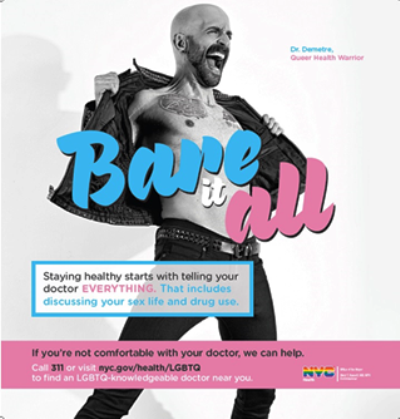Science & Health
Doctor Discrimination Against LGBT Banned
By Sneha Dey
Spectrum staff
Dr. Demetre Daskalakis, 43, sat in a hospital room waiting for the kind of medical questions that might be considered a kiss-and-tell about his sexual history.
But, that day, the doctor never asked about that history, or about whether Daskalakis wanted a standard test for HIV, which straight and gay people, alike, do take these days.
“He created this … silence around [my sex life],” said Daskalakis, now deputy commissioner for the New York City Department of Health and Mental Hygiene’s disease control division. “It wasn’t okay.”
As a patient and a practicing physician specializing in infectious disease and immunology, Daskalakis knows that discrimination against lesbian, gay, bisexual, transsexual and queer [LGBTQ] patients does happen. At their first check-up, many of his own patients say they are relieved to have finally found a doctor they can be open with.
“If you can’t even get through a door [without feeling] like someone hates you or judges you, you’re not going to get anywhere in terms of health care,” said Daskalakis, who’s been called “faggot’ and “queer” as he walked the city streets.
Frustrated and angered by his own experiences at the doctor’s office and the similar experiences of others, Daskalakis raised the issue with his colleagues at the health department. He challenged them to help him address what he saw as a major problem. That resulted in the now more than 2-year-old Bare it All campaign, which created the LGBT Health Care Bill of Rights and a health map of physicians who willingly accept lesbian, gay, bisexual, transsexual and other non-heterosexual patients into their practices and have expertise in talking to them about their health.
The bill of rights makes it “illegal to discriminate on the basis of a person’s sexual orientation, gender identity or gender expression in public accommodations, including in health care settings,” according to that document.
Also, callers to the city’s 3-1-1 line can get the names of doctors who are aligned with the Bare it All effort.
“We’re just trying to take the torture out,” Daskalakis said.
The bill of rights makes it clear that the city is serious about outlawing anti-LGBTQ discrimination, and that doctors should take the matter seriously, too. It lets LGBTQ people file a complaint against a doctor they believe has discriminated against them; the city’s Commission of Human Rights investigates the allegations.
In mid-July the city shut down four substance abuse centers for refusing to admit transgender patients or formally acknowledge those patients’ stated gender identity.
When they were starting the campaign, health department officials, Daskalakis said, initially were afraid they would offend doctors. “We were scared. It’s a little intimidating … [We’re] calling out physicians’ baggage.”
But the campaign has received plenty of positive feedback, he said. Some doctors have called asking to be on the list.
For Daskalakis, the work he does through Bare it All reaffirms the reasons he became a doctor; in particular, he wanted to help LGBTQ patients.
Those who know him are not surprised by that, or by the ground he is breaking in this area of medical care.
“Personally, Demetre is very accessible and open. Professionally, he’s no-holds-barred. He wants to get the job done. And not just get it done okay, but in the most amazing way possible,” said Jordan Eagles, 43, an artist, who is Daskalakis’ patient and close friend. They’ve collaborated on some of Eagles’ LGBT-centered art projects.
Bare it All posters, featuring everyday New Yorkers, are in city subways and bus stops. Daskalakis is one of the faces on those posters and the campaign’s website.
“It’s bold for someone in public health to put themselves out there like that. That is Demetre,” said Dr. Judith Aberg, 61, Mount Sinai Hospital’s chief of infectious diseases. Aberg gave Daskalakis his first job as a physician back in 2005.
Seeing his physical embodiment advertised in the places where thousands upon thousands of commuters roll through daily feels weird, he said. But “if I’m going ask others to flash, it’s not right unless I’m one of the people to do it,” he said.
The MTA ad calls him a “queer health warrior,” a title he adopted three years ago. It’s on his Twitter bio.
What’s next?
“I want it bigger,” he said. Among other goals, he hopes insurance providers will start using the health care map and pointing patients to New York City doctors who are in step with the Bare It All mission.


